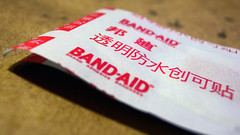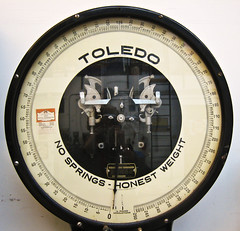
[Cross-posted to Quantified Self]
What's the smallest thing you've tracked that had a short turnaround time but generated useful results? I've noticed that the kinds things we try in the Quantified Self community are often longer-term experiments that seem to be a week or two long at a minimum. I think this is primarily due to the effects of what we try need time to emerge. (This brings up the issue of how much value there is in investigating subtle results, which came up at our recent Boston QS Meetup - recap here.)
However, as I work to adopt an experimental mindset about life, I've noticed these efforts can vary in scope, duration, and complexity. Because interesting things happen at extremes, I've been exploring the very smallest class of activity, what I call micro experiments. I've found that trying little things like these is a great way to test-drive treating things as experiments, and maybe offer the chance for non-QS'ers to dip their toes in the idea of tracking on a tiny scale. (Of course you shouldn't risk shortening your life over any.) Researching the idea didn't turn up much, though Micro-Experiments and Evolution was stimulating.
Here are some examples I've tried and their results. Are they true experiments? Are they useful? I'm curious to know what you think.
Jing: I tried using Jing, a free tool for doing short screencasts, to explain a bug I found in my site. I usually write them up, but because it was complex, it would have taken a lot to explain it. Instead I created a four-minute screencast, emailed the link to my developer, and measured the results. Conclusion: Worked great! Time to record: 4 minutes. His understanding of the problem: High. Enjoyment level of trying a new tool: Fun.
Testing expectations: Left unchecked, I tend to be pessimistic and anxious, which I continue working to improve. Here's a technique I stumbled on that works well in micro experiment form. The idea is to treat your expectations as a model, make your assumptions and predictions explicit, then put them to the test. I applied it to two difficult phone calls I had scheduled, and found that my expectations were way off. In one case I was asking a fellow writer for a favor (mentioning an ebook I created), and instead of turning me down (my working model), he was happy to help. The other was a sales call in my last career to a prospective client, which I expected to go swimmingly. Instead it was a disaster! After analyzing what happened and comparing it to my model, I formed a couple of new ideas on how to do future ones. Surprisingly, the minute I thought of these as an experiments and wrote down my expectations, I felt immediate relief before the calls.
Pay for someone's parking: As a touchy-feely micro experiment, I was standing in line to pay for parking at a garage, and on a lark I decided to pay the next person's fee (it's almost always $0.50). I didn't know how they'd react (find it odd and refuse, for example), but the result: Evident happiness level of subject: High (I got a nice smile). My feeling: Walked away with a lighter step.
Disabling email: I continue to struggle keeping email from sucking my time and attention, so I tried disabling my email program for a day. This email vacation was helpful, but surprisingly uncomfortable. Not being able to monitor it clearly indicated a bit of an addiction. I didn't end up adopting it.
Decisions and glue: I sometimes stress about getting something new perfect the first time. Yes it's unrealistic, but that's the brain I'm stuck with. Treating the decision as a micro experiment helps me enjoy things more. For example, I had to repair two broken lawn chairs at home, and couldn't decide which of two glues to try. Then I realized this was a natural parallel type of experiment, and tried them both, one per chair. Result: Gorilla glue worked far better than the GOOP. Trivial? Maybe, but next time I don't have to wonder.
Not eating before exercise: Eating breakfast is commonly considered important, so I wondered what would happen if I skipped eating all morning then mountain biking at 1pm for an hour. Result: My performance was just fine, but I was hungry afterwards! Now I don't worry so much if I'm pressed for time.
Getting a bank fee waived: My wife needed a document notarized, so I brought her to the mega-bank where I was forced to do business for a time. The teller said she couldn't do notarize it because my wife wasn't listed on my account. In a bold (for me) move I did a social experiment by asking for the manager, who ended up OK'ing it, no problem. I was a little embarrassed until I thought of it experimentally.
Chocolate skin, cranberry sauce: There are lots of ways to experiment in the kitchen; here are two micro experiments I tried. First, I drink hot chocolate every morning (melt the expensive dark stuff into milk) and it sometimes develops a skin on top. (Hey - I discovered pudding!) To avoid that, I tried putting the heat on high and stirring constantly, instead of my usual medium heat with less stirring. The question was whether heat/time would affect skin forming. Result: ~50% reduction. As a second example, we had some leftover cranberries (I live in New England) and I wanted to make a sauce, but I was too lazy to follow a time-consuming recipe. Instead I microwaved a handful of them in a bowl with a little orange juice and honey. Result: An explosion of flavor. (Literally - it blew up while cooking.) Edibility was marginal.
 Tuesday, May 3, 2011 at 10:27AM
Tuesday, May 3, 2011 at 10:27AM  quote
quote 




